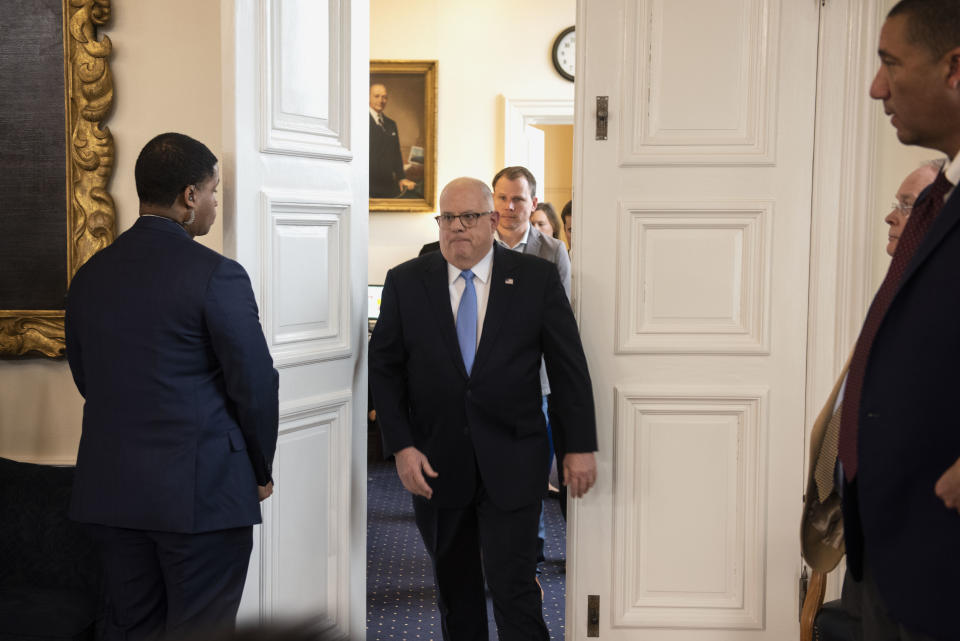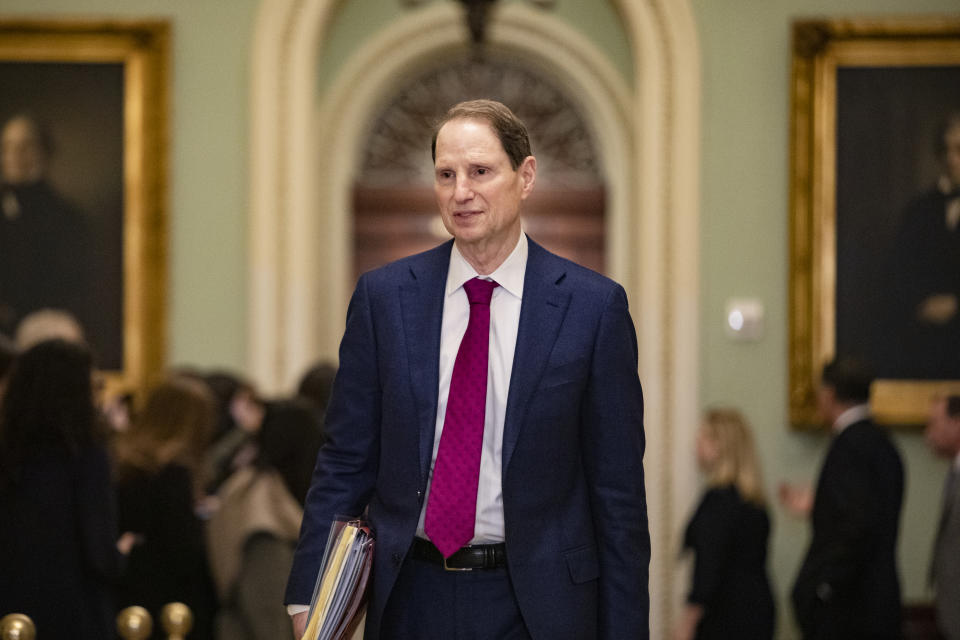Senator says outside pressure will move GOP toward expanding ballot access during coronavirus pandemic
WASHINGTON — A Democratic senator who’s been pushing the country to prepare for the difficulties of holding a presidential election during an ongoing pandemic said he hopes pressure from outside Washington will convince Republicans to embrace expanding early voting and mail-in balloting.
“We’re going to see more and more Republicans at the state and local level, I think, start breaking from [Senate Majority Leader] Mitch McConnell, who by and large has resisted virtually all ideas that help expand the franchise,” said Sen. Ron Wyden, D-Ore., in an interview.
“I hope that we’re going to start seeing more of a disconnect between Republicans at the state and local level [and national Republicans], and we already are,” Wyden said on “The Long Game,” a Yahoo News podcast.
Wyden pointed to Maryland Gov. Larry Hogan, a Republican who pushed his state’s primary back and is weighing whether to go to an all-mail primary on June 2, a decision he’ll make in the coming days, a spokesman told Yahoo News.
It’s noteworthy that Hogan has received entreaties from Maryland Democratic leaders who want to preserve some form of in-person voting “for a limited number of our citizens.”
Maryland Senate President William C. Ferguson and House Speaker Adrienne Jones, both Democrats, wrote Hogan a letter Tuesday noting that “minority voters are less likely to vote by mail, and … transient and low-income populations are less likely to participate or even receive ballots.”

Yet Republican leaders in Washington view the Democratic proposals to expand ballot access as political schemes, even though the election this fall will occur at a time when many public health experts — including the president’s own advisers — expect a second wave of infections.
House Minority Leader Kevin McCarthy, R-Calif., on Wednesday described efforts to expand early voting and vote-by-mail as “partisan objectives,” lumping them in with other issues he claimed “have nothing to do with our war against the disease.”
It may be true that planning for the fall election will not defeat the coronavirus, but it is a way of responding to it. The Congressional Budget Office issued projections on Thursday that “included the possibility of later outbreaks of the virus” and said that in such a scenario “social distancing was projected to diminish by only three-quarters, on average, during the second half of the year.”
The rescue package signed into law a week ago included $400 million to help states prepare for a fall election that would see more ballots cast by mail, and for expanded early voting.
Wyden called that “progress” but said there is “a long, long way to go.”
House Democrats proposed $4 billion for the fall elections, and another proposal by Wyden and Sen. Amy Klobuchar, D-Minn., was pegged at $2 billion, he said. That figure matches a cost estimate by the Brennan Center for Justice, a nonprofit advocacy group at New York University.
President Trump, however, has dismissed the Democratic proposals in terms similar to McCarthy’s but also let slip that expanding access to voting in the fall would work to the advantage of Democrats. “If you ever agreed to it, you’d never have a Republican elected in this country again,” Trump said this week.
And a top Georgia Republican, House Speaker David Ralston, said this week that it would be “extremely devastating to Republicans and conservatives in Georgia” to mail ballots to every voter, as the secretary of state plans to do for the primary election.
“Every registered voter is going to get one of these,” Ralston said. “This will certainly drive up turnout.”

Still, Wyden said “it’s pretty hard … to argue this was somehow partisan,” referring to his push for more mail-in and early voting. But money for states to prepare will have to come from Congress, where Republicans control the Senate.
Wyden said he is optimistic that actions and statements by Republican governors, as well as election officials across the country, will push Washington Republicans to work with Democrats on ways to prepare for the fall election.
“Political change is grassroots up,” Wyden said. “At the grassroots level, those officials at the state and local level are increasingly going to start saying, ‘There is no Plan B for elections this year’ if their communities don’t have the vote-by-mail option.”
“It seems to me that if we’re looking at the worst-case analysis for the fall, the choice may well be either voting by mail or not voting at all,” he said.
_____
Click here for the latest coronavirus news and updates. According to experts, people over 60 and those who are immunocompromised continue to be the most at risk. If you have questions, please reference the CDC and WHO’s resource guides.
Read more:



